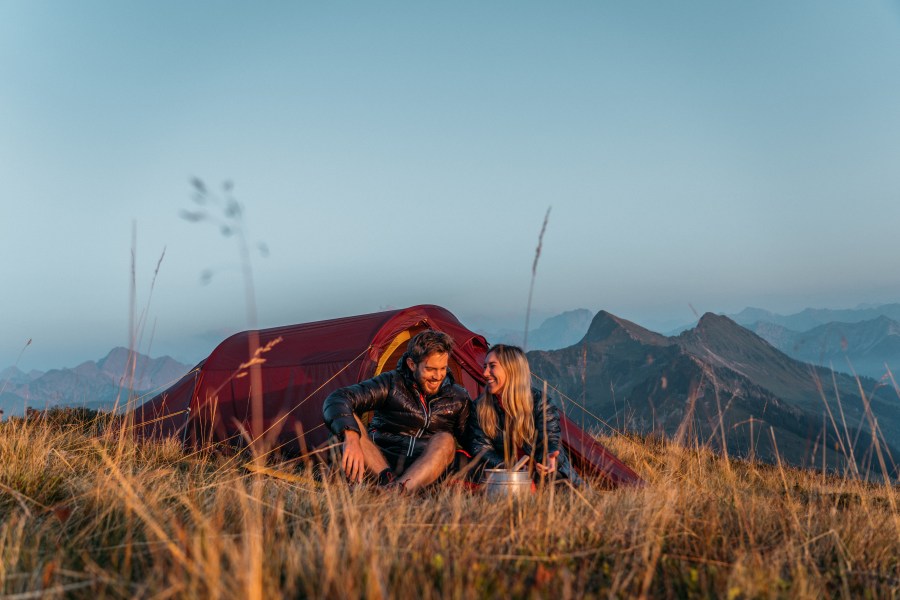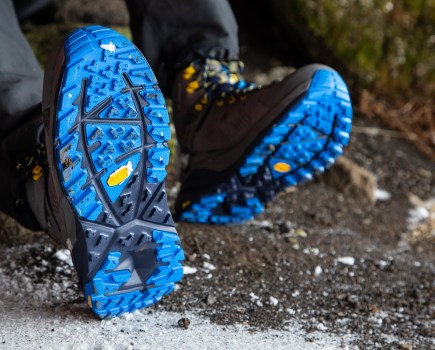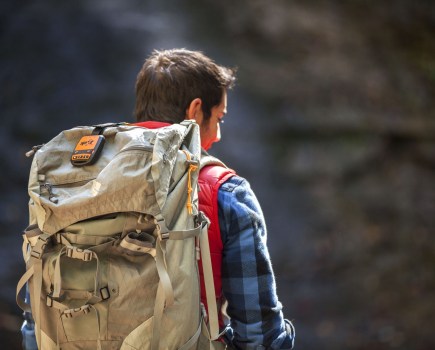As with most queries related to spending a night outdoors, it’s totally dependent on the camp and the camper. It’s helpful to address these questions: why and when do you need a tent for backpacking? It’s all about those all-important outdoor conditions.
Get prepared – check the forecasts, consult your maps and get equipped with the right gear to suit your adventure. When it comes to sleeping shelters and tents, this guide is a good place to start.
Main image: Nordisk
- Why do you need a tent for backpacking?
- When do you need a tent for backpacking?
- What are the alternatives to a camping tent?
A guide to backpacking tents
Why do you need a tent for backpacking?
Weather
The function of a tent is simple. Good tents are designed to protect you from the elements, primarily rain, wind or snow, so you and your gear stay dry and close by! It might not be so obvious here in Britain, but tents also protect campers from the sun in warmer climes.
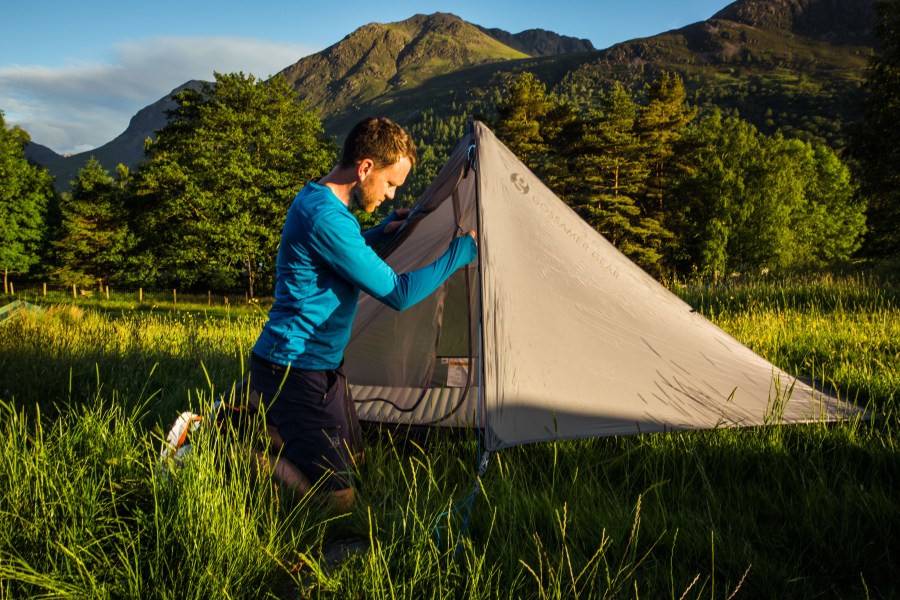
James Forrest pitching on a low-level summertime Lakeland camp. Credit: Jessie Leong.
Conditions aside, tents are also handy to put a small barrier between you and the local fauna. For anyone who’s lain awake listening to snuffles or scuffles just beyond the tent walls in the middle of the night, this might be particularly important – although it’s worth adding most of the creatures you’ll meet in the hills of Britain are harmless. However, a secure tent can stop encounters with snakes and sheep alike so, depending on your phobias, a tent might be non-negotiable.
Privacy
Finally, a tent is going to offer you a lot more privacy outdoors than its alternatives. If you plan on longer trips when you’ll need to change clothing, and you know you’ll be camping in more popular spots, you might prefer a lightweight tent for this reason. Our Gear team reviewed the best two person tents. We have also put Best family tents to the test.
Warmth
A tent isn’t insulated but a night under the stars and a tent will be warmer than sleeping without. Tents keep the wind off, which along with warm clothing, a sleeping bag and a sleeping mat are the key ways to stay warm.
When is a tent the best option?
With that said, tents are a must for most campers in rougher conditions when you aren’t treated to a clear night. In any temperature, rain and wind can threaten your safety and ability to keep warm. Not to mention, getting drenched or buffeted about isn’t exactly enjoyable and likely won’t allow for much sleep.
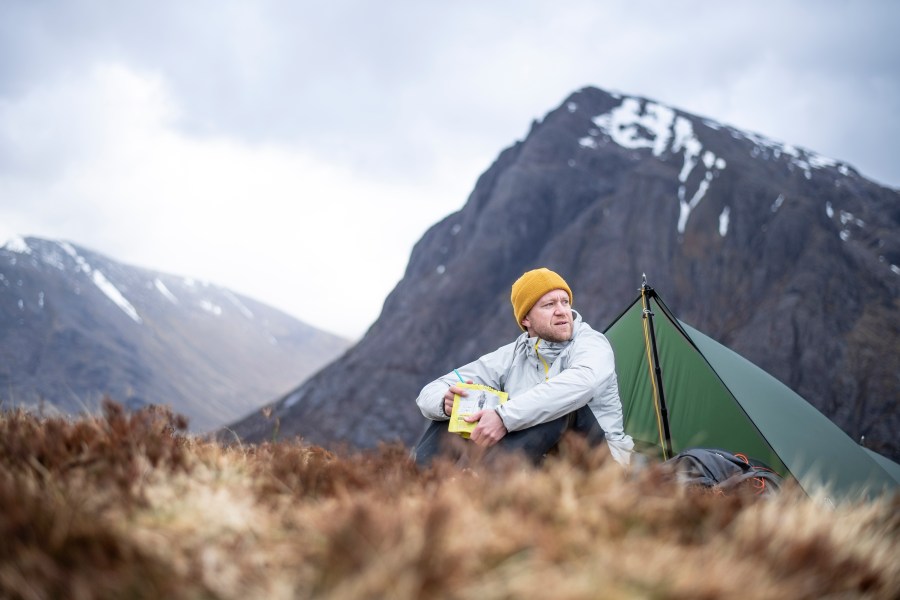
James Forrest wild camping on Beinn a’Chrulaiste. Credit: James Roddie.
Temperature and resulting conditions are, of course, also important factors, whether it’s a crisp winter’s night or not. When temperatures drop, a 3-season tent, built to handle spring showers or summer storms, might not be enough. In extremely windy or snowy conditions, a 4-season tent might be required. These are built to withstand serious weather including high winds and heavy snowfall, some featuring overlapping poles supporting robust fabrics, for example. They are no more insulated than a 3-season tent, but heavy-duty features are designed to keep the weather at bay – and you dry and warm – when the going gets rough.
In the snow, there are indeed alternatives to tents such as snow shelter. It’s also about having the right tools for the job – or kit for the weather. But this takes experience and a lot of know-how as well as time to develop confidence and competence. Most will prefer a tent. It is also worth noting that heavy snowfall can actually collapse a tent. You should develop your understanding of avalanches and pitch up in a place where this won’t be a threat.
Ready to face the elements
The most important factor, however, is a matter of personal preference. Whether it’s a late summer’s evening or a long, dark night in the snow, you must feel comfortable with your setup and know your own limits. Before heading up to elevation, where temperatures drop very low and conditions are much more changeable than on low-level camps, try new tent-free camp gear in a familiar place with a backup plan, ideally in calm and warm weather.
You can learn more about camping tents and sleeping bag temperate ratings, guided by regular contributor Matthew Jones.
What are the alternatives to a camping tent?
A bivvy
Behold the bivvy! This is probably the most popular alternative to using a tent on wild camps for a multitude of reasons. Bivvying is a lightweight way to stay warm through the night while remaining connected with your surroundings. Open to the elements, bivvying allows you to stargaze on clear nights and feel the dew on your face in the morning – if that’s your cup of tea.
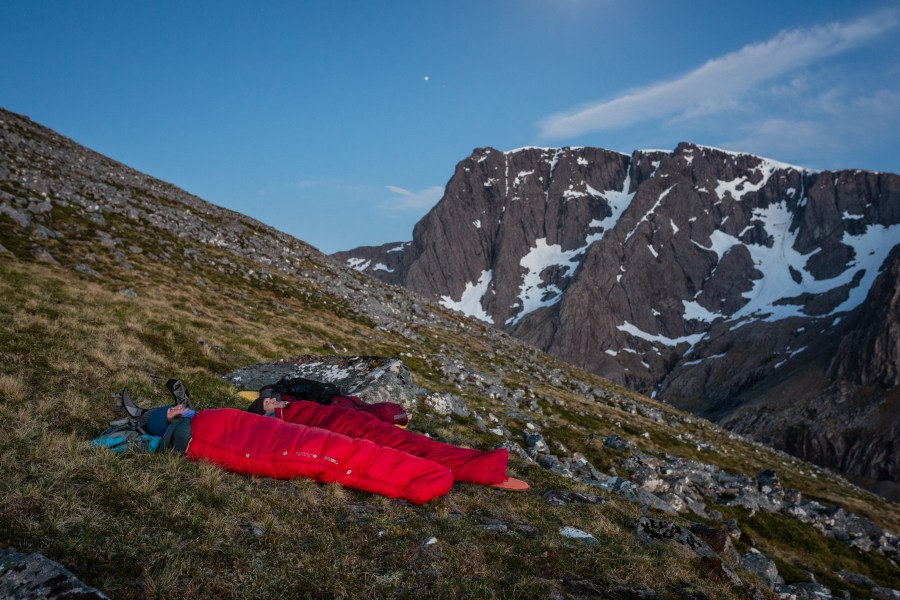
A winter bivvy below Ben Nevis. Credit: Dougie Cunnigham.
Don’t fancy a night on the ground? Camping cots are sometimes favoured by those prone to aches and pains and who feel the chill of the cold ground. Simply, the small body-length structures raise you just a few inches off the ground so you still have the experience without the extra shivers.
Others prefer to hook up a camping hammock between the bows of trees. With room for two, and plenty of space for insulated sleeping bags. Sometimes, hammocks come with in-built insulation so can make for a very peaceful night as Mother Nature rocks you to sleep.
A tarp
While these solutions give you the feeling of freedom outdoors, there is a halfway house between the closed-off structure of a tent and being totally open to the elements above you in a bivvy. Behold the tarp! Throw in a tarp alongside a camping solution to keep you from getting too cold on the ground on a rainy evening and you’ve got yourself a very cosy camp.
Tarps are cost-effective camping kit. Much cheaper than tents, tarps still provide you with protection from rain, but give you easy access, ventilation, space and – most importantly – the view. They are also extremely lightweight – no poles! – and easy to assemble. Many backpackers, for example, carry a tarp for backup should their tent malfunction. The simplicity and durability of a tarp means no fuss and allows plenty of headspace to enjoy a minimalist adventure.
For some camps, as with tents, you may not need a traditional sleeping bag, either. There are plenty of alternatives to sleeping bags to try out on warmer nights in the great outdoors.
If you are new to nights outdoors, James Forrest has answered all of your burning questions on wild camping from toilets to leaving no trace and whether it’s legal.

